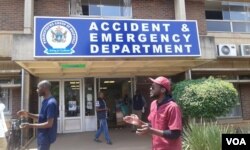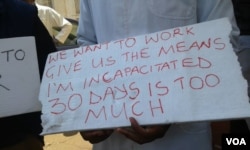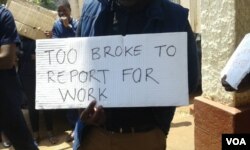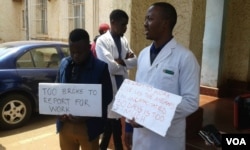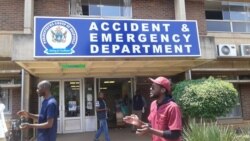The World Health Organization (WHO) says it is concerned about the doctors’ strike in Zimbabwe, which has paralyzed the public health sector, leaving thousands of people without access to basic medical care.
In an interview, WHO country director, Dr. Alex Gasasira, appealed for proper dialogue between the striking doctors and government, saying some vulnerable people are being turned away in state hospitals.
“We hear that many patients are being turned away, some of them with very serious conditions. So we are concerned that the most vulnerable people who are in most need of services, would not be able to access the services that they would require if their doctors keep being away from work. So, that is a big concern for us. So that is why we would hope that this could be resolved and they returned to work soonest.”
Gasasira said indications are that the Zimbabwean government is trying its best to stop the strike by junior and senior doctors, who joined the industrial action Thursday.
“We are very, very hopeful that proper dialogue between the doctors and the government the employers can happen, because again as we have been informed that the government is using their own resources, as well as through partnerships with other countries, are trying to address the issues of working conditions, rehabilitating facilities at hospitals so that doctors can have what you need to work with and provide the services for their people, so we as WHO are really hopeful that this dialogue can happen.”
The junior doctors declared that they were “too incapacitated” to report to work on September 3. They are demanding salary increases and improved working conditions. Each doctor earns at least $200 a month.
Gasasira further noted that the doctors’ grievances cut across all sectors due to the current harsh economic situation in the country.
“As you may know, the complaints of the doctors are around, are factored around the economy the current economic condition of the country, which is really the higher level than just the health sector. Their main complaints as you may know is around the payments, the conditions of service. So these factors are affecting many sectors, not just that, in fact all aspects of life.”
He said the WHO is helping in alleviating challenges in the health sector in Zimbabwe like in other nations.
“… WHO as you know works with governments, works with partners to bring guidance, you know, bring the best practices from different places to strengthen the health systems of countries. So we have shared advice, shared the best practices … One of the recommendations that that WHO makes to countries in these situations is for the key architects to engage in dialogue. The key actors are usually the employer, the government, the professional associations of the medical personnel themselves, you know, people who are associated with labor unions. Usually these national actors because this provision of health services is the responsibility of governments WHO does not provide health services except in very, you know, in situations where governments are unable like in situations of conflict situations of, you know, massive disruptions due to either massive outbreaks or massive emergency situations.”
Zimbabwe is currently facing an economic recession, which has resulted in serious local and foreign currency shortages fueled by the almost collapse of some productive sectors.





